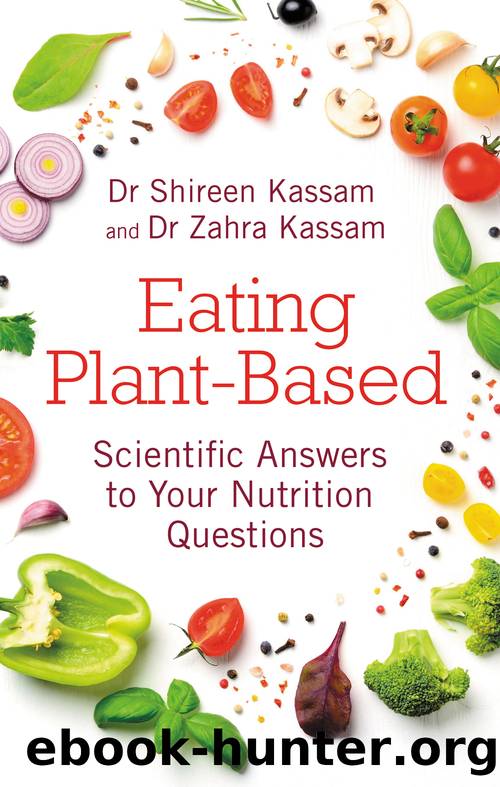Eating Plant-Based by Kassam Shireen;Kassam Zahra;

Author:Kassam, Shireen;Kassam, Zahra;
Language: eng
Format: epub
Publisher: Hammersmith Books Limited
Published: 2024-10-17T00:00:00+00:00
11.9 What about mental health? Havenât studies on people following vegan and vegetarian diets shown that they are more depressed?
A systematic review from 2021 concluded that people who avoid eating meat have a higher prevalence of depression, anxiety and/or self-harm behaviours101. This sounds rather alarming and of course made media headlines, but what should you know about the study before drawing any conclusions?
This study was funded in part via an unrestricted research grant from the Beef Checkoff, through the National Cattlemenâs Beef Association. We know that studies sponsored by industry are more likely to find results in favour of their products, drugs or devices102. Food-industry-sponsored studies are no different. Sixteen of the 18 studies included in the review are of cross-sectional design103. This is a weak study design as it examines a group of individuals at only one point in time. It cannot take into account what came first â the mental health disorder or removing meat from the diet. The review clearly states that for most studies they did not know which came first. Certainly, in one study, meat was excluded from the diet on average five years after the diagnosis of a mental health disorder. The authors clearly state that: âThere was no evidence to support a causal relation between the consumption or avoidance of meat and any psychological outcomesâ for the reasons stated above.
Eleven of the 18 studies included showed a negative impact of meat abstinence on psychological well-being, four studies showed no impact and three showed a favourable impact. So, by no means did all studies included reach the same conclusion as the review article. The one randomised controlled trial (RCT â a more rigorous study design) of diet and mental health that was included actually showed benefit for a vegetarian diet pattern.
The quality of the diet in those who avoided meat consumption was not included. Vegetarians and vegans can live off ultra-processed foods, which we know can adversely affect mental health104. This cannot be extrapolated to conclude that a healthy vegetarian or vegan diet causes mental health disorders.
We have plenty of more robust data from prospective cohort studies demonstrating that diet patterns that increase the consumption of whole plant foods, especially fruit and vegetables, whilst minimising animal-derived foods, are associated with better mental health and well-being105. We have data from two randomised studies, the SMILES and the HELFIMED trials, that demonstrate the benefits of a Mediterranean diet pattern, which emphasises whole plant foods whilst minimising red and processed meat, for those with an established diagnosis of depression106, 107. We even have a randomised study examining the impact of a low-fat vegan diet in a multi-centre workplace intervention conducted by the PCRM (Physiciansâ Committee for Responsible Medicine) for the company GEICO in the US108. It is not clear why this study was not included in the systematic review. Altogether, 292 participants across 10 corporate sites, who were overweight and/or had a history of type 2 diabetes, were randomly allocated to follow a low-fat vegan diet composed of fruit, vegetables, whole grains and legumes, or to continue their usual diet for 18 weeks.
Download
This site does not store any files on its server. We only index and link to content provided by other sites. Please contact the content providers to delete copyright contents if any and email us, we'll remove relevant links or contents immediately.
How to Be a Bawse: A Guide to Conquering Life by Lilly Singh(7154)
Deep Work by Cal Newport(6563)
The Longevity Diet by Valter Longo(4857)
The Fat Loss Plan by Joe Wicks(4620)
The Four-Pack Revolution by Chael Sonnen & Ryan Parsons(3793)
The Ultimate Bodybuilding Cookbook by Kendall Lou Schmidt(3707)
The French Women Don't Get Fat Cookbook by Mireille Guiliano(3413)
Super Food Family Classics by Jamie Oliver(3246)
Not a Diet Book by James Smith(3149)
Turn Up Your Fat Burn! by Alyssa Shaffer(3059)
Factfulness_Ten Reasons We're Wrong About the World_and Why Things Are Better Than You Think by Hans Rosling(3046)
Self-Esteem by Matthew McKay & Patrick Fanning(2953)
Tom Kerridge's Dopamine Diet: My low-carb, stay-happy way to lose weight by Kerridge Tom(2952)
Body Love by Kelly LeVeque(2904)
The Unbecoming of Mara Dyer by Michelle Hodkin(2860)
The Fat Chance Cookbook by Robert H. Lustig(2642)
Tone Your Tummy Type by Denise Austin(2635)
LL Cool J's Platinum 360 Diet and Lifestyle by LL Cool J(2584)
Men's Health Best by Men's Health Magazine(2390)
